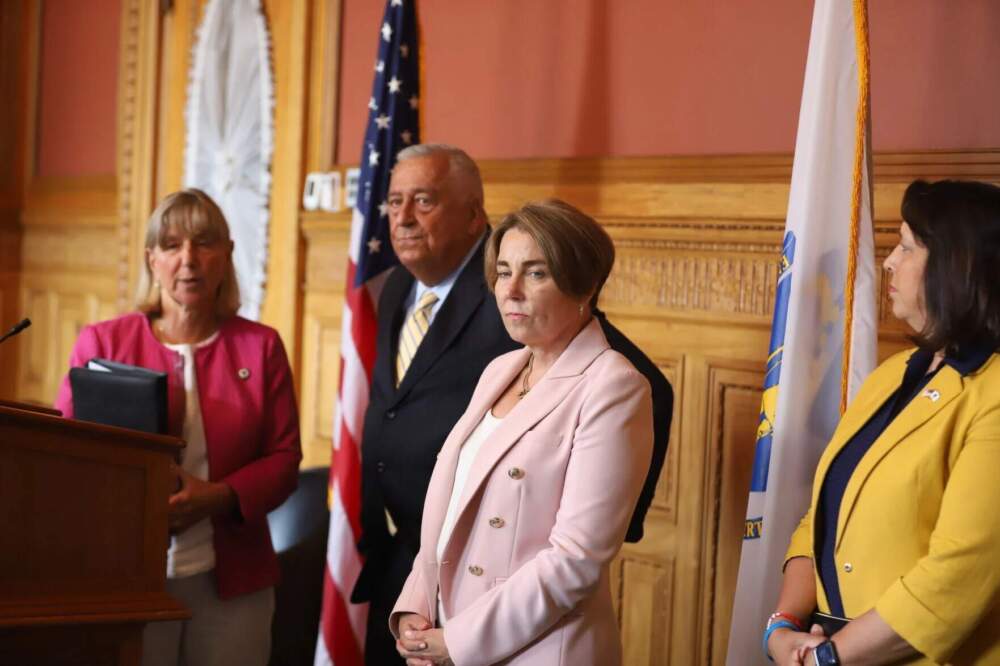Massachusetts lawmakers embarked on a six-week holiday season recess Wednesday night, after sending one last spending bill to Gov. Maura Healey’s desk and gesturing toward major policy changes in 2026.
The House, Senate and Healey spent much of this year backfilling accounts they underfunded in last year’s annual budget. One spending bill after another moved through the branches. They also agreed in August to a law to expand reproductive health care protections in the face of threats from other states.
Beacon Hill has passed 66 new laws so far this year, but the vast majority of those are local bills or affect one person. Major bills still on the move address data privacy and violence against transit workers, and work on those bills and many others may continue during an informal session period that runs into early 2026.
While Democrats hold big majorities in both branches, House and Senate leaders are often not aligned on top priorities, which means an often longer path for bills to reach the governor, or no path at all.
The Senate this year has approved bills dealing with access to library books, an expansion of the “move over” road safety law, protections against abuse of people with disabilities, fairness in debt collection practices and an attempt to curb cellphone use by students while in school. Those bills await House attention.
Similarly, the House is hoping the Senate will take up bills that have cleared the House and tackle topics like investments in public higher education campus infrastructure, the licensing of home care workers, reforms to early literacy instruction, child welfare reforms and changes to help retired teachers access pension benefits.
Those bills are in a better position than most others to reach the governor’s office, but there are no guarantees and urgency is not a word that State House insiders associate with the approach to legislating on Beacon Hill. The Legislature operates under a carryover rule that lets bills hold their place into the second year of the two-year session, when the odds will improve for reaching House-Senate accords and enacting more legislation.
Wednesday was the last day under legislative rules for the House and Senate to hold formal sessions this year to weigh significant and controversial bills. The branches wrapped up work on a $2.3 billion bill that gives $2 billion to MassHealth to cover unbudgeted costs in the fiscal year that ended June 30.
The spending bill on Healey’s desk also withholds significant funding sought by county sheriffs to enable Inspector General Jeffrey Shapiro to investigate fiscal practices and report back by February. The bill also opens access to patient records from more than 25 state-run institutions, many of which are now closed, that served people with intellectual or developmental disabilities or mental health conditions.
House and Senate Democrats also coalesced this week around a resolution to rescind previous calls from the Massachusetts Legislature for Congress to hold an Article V convention. While such a convention has never been held, Democrats want to remove any justification for conservatives and Washington Republicans to open up the U.S. constitution to amendments that they claim might undermine a range of rights.
The House vote for the resolution was 155-3. It cleared the Senate 34-4.
The House voted 158-0 Wednesday to approve legislation to reduce violent attacks in health care workspaces, improve facility incident reporting, and create legal protections for employees harmed in the line of duty.
“Our health care workforce has endured violence at alarming rates for far too long,” Katie Murphy, an ICU nurse and president of the Massachusetts Nurses Association, said after the unanimous vote. “This House vote is a powerful acknowledgment of the crisis and an important step toward ensuring every healthcare worker has the protection we need to safely care for our patients.”
The Senate on Wednesday night voted 30-7 to approve a bill to overhaul the Cannabis Control Commission and marijuana laws. That bill, and its House counterpart, are destined next for conference committee talks.
The branches will head toward the winter months, when higher energy bills start hitting mailboxes, without making much progress on legislation designed to make energy more affordable.
